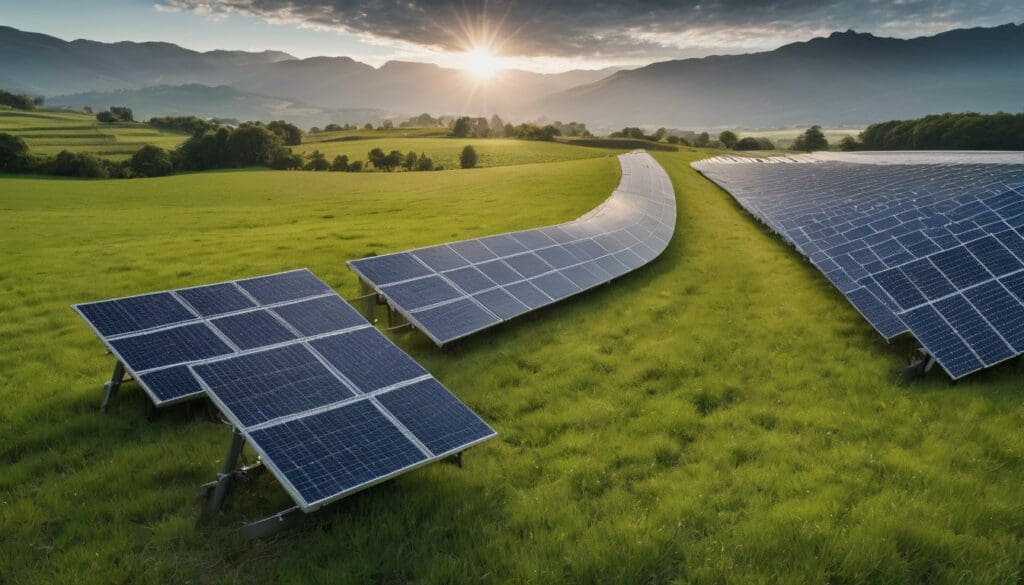As keen gamers, we’re forever on the hunt for methods to enhance our gaming sessions whilst keeping an eye on our environmental impact. We’ve faced the same conundrum as many of you – how do we keep those epic gaming marathons going without leaving a hefty carbon footprint in our wake? Turns out solar and wind energy are at the forefront of this challenge.
Our exploration into renewable energies has unearthed some rather promising avenues for not only fuelling our consoles and PCs but also paving the way towards a more sustainable future.
So why don’t you join us as we delve into this topic? Together, let’s ignite a conversation about clean energy and spark a bit of change!
Key Takeaways
- Solar and wind power are leading the renewable energy revolution, with advancements making them more cost-effective and efficient than ever before.
- Renewable energies such as hydroelectric, biomass, geothermal, and ocean power are vital in creating a sustainable future by reducing carbon emissions and combating climate change.
- The global shift towards renewables offers significant economic benefits through job creation, lower energy bills for consumers, and stimulating local economies.
- Electrification of transportation is complementing the rise of clean energy by offering eco – friendly alternatives like electric vehicles which reduce greenhouse gas emissions.
- By transitioning to renewable sources like solar and wind power we can decrease our dependence on fossil fuels, fostering a low-carbon economy and promoting better health outcomes.
Renewable Energy Sources around Us
Renewable energy sources are all around us, from the sun and wind to water, plants, and even heat from the earth’s core. These abundant resources offer a sustainable and eco-friendly alternative to traditional fossil fuels.
Solar energy
Harnessing solar energy is like capturing the pure power of the game world’s sun to light up our own reality. Our rooftops and open fields are becoming arenas for solar panels, a battleground against climate change where every watt we produce marks a victory in clean energy generation.
With technology advancing, these eco-friendly warriors turn more sunlight into electricity than ever before, pushing us closer to an energy-efficient future and reducing our carbon footprint.
We’re witnessing a renewable revolution, with solar power leading the charge. This low-carbon army doesn’t just fight for environmental health; it creates job opportunities and drives economic benefits too.
From vast solar farms to backpack-sized portable chargers, this green energy source adapts to all levels of demand, powering everything from massive gaming conventions to your latest handheld device without missing a beat.
Wind energy
Although solar energy is an essential clean power source, wind energy is also a crucial player in the renewable revolution. Wind power harnesses the kinetic energy of moving air to generate electricity, making it one of the fastest-growing renewable energy sources globally.
As technology advances, wind turbines are becoming more efficient and cost-effective, contributing to the increasing adoption of wind energy as a sustainable power solution.
Wind power presents numerous advantages such as being environmentally friendly, contributing to lower carbon emissions while providing economic benefits and creating employment opportunities.
Hydroelectric power
Moving from wind energy to hydroelectric power, we observe another efficient and eco-friendly energy source. Hydroelectric power harnesses the force of flowing water to generate electricity, offering a reliable and consistent renewable energy option.
The process involves using turbines to convert kinetic energy from moving water into electrical power, making it a vital part of the clean energy revolution. With its ability to provide clean electricity without emitting greenhouse gases or pollutants, hydroelectric power plays a significant role in transitioning towards a sustainable and low-carbon economy.
Hydroelectric power also holds immense potential for the future, as it presents an opportunity to address climate change and reduce reliance on non-renewable sources. Additionally, with ongoing advancements and innovations in renewable technology, there is continuous interest in maximising the efficiency of hydroelectric plants while minimising their environmental impact – further highlighting its importance in our transition towards cleaner and more sustainable energy solutions.
Biomass energy
Biomass energy, derived from organic materials like wood and agricultural waste, is a renewable power source gaining attention. Biomass can be converted into energy through various processes such as combustion, biochemical conversion, or thermochemical conversion.
The significance of biomass lies in its ability to reduce greenhouse gas emissions and provide an eco-friendly alternative to fossil fuels. As we look to the future of clean energy, biomass holds promise for powering homes and industries while contributing to a low-carbon economy.
Renewable resources such as biomass play a vital role in the transition towards sustainable energy solutions. With ongoing advancements in technology and increasing awareness of environmental impact, biomass energy stands out as an essential part of the renewable revolution which paves the way for a cleaner and greener future powered by eco-conscious energy sources.
Geothermal energy
Geothermal energy harnesses heat from the Earth’s core to produce electricity. This renewable resource provides a consistent and reliable source of power, with geothermal plants operating around the clock, regardless of weather conditions.
It is an environmentally friendly energy source that produces minimal emissions and has a low impact on the surrounding environment.
Geothermal energy also holds significant potential for direct use applications in heating and cooling systems. With advancements in technology, geothermal sources are becoming increasingly more accessible as a sustainable alternative to traditional heating and cooling methods.
Ocean energy
Ocean energy, including wave and tidal power, is an emerging renewable energy source that harnesses the motion of waves and tides to generate electricity. These forms of ocean energy have vast potential for providing clean and sustainable power.
With increasing focus on reducing carbon emissions and transitioning towards eco-friendly energy sources, ocean energy holds promise for contributing to a low-carbon economy.
Renewable revolution enthusiasts are drawn to the innovative technology behind ocean energy as it presents new opportunities for diversifying the renewable energy mix. The development of efficient wave and tidal devices has gained momentum in recent years, offering a glimpse into how these alternative power sources could play a significant role in our transition towards cleaner, more sustainable energy solutions.
The Advantages of Renewable Energy
Renewable energy offers lower costs, healthier environments, and job creation. It also provides economic benefits and reduces carbon emissions.
Lower cost
Renewable energy sources like solar and wind power offer a lower cost alternative to traditional non-renewable energy. The declining costs of solar panels and wind turbines make renewable energy more affordable for both businesses and households.
As the technology continues to advance, the overall cost of generating electricity from renewable sources is decreasing, making it an attractive option for sustainable power generation.
The economic benefits of renewable energy are becoming increasingly apparent as these technologies become more accessible. With reduced reliance on fossil fuels, there’s potential to save money in long-term energy bills while contributing to a cleaner environment.
Healthier for the environment and people
Renewable energy sources, such as wind and solar power, contribute to a cleaner environment by reducing air pollution and minimising the release of harmful greenhouse gases. Transitioning to these eco-friendly energy options helps in curbing the impacts of climate change, which is essential for safeguarding the well-being of current and future generations.
Additionally, embracing renewable resources promotes human health by decreasing reliance on fossil fuels that can cause respiratory illnesses and other health complications due to air pollution.
The shift towards clean energy not only benefits the environment but also leads to improved public health outcomes. By choosing renewable energy sources over traditional ones, we are actively contributing to a healthier planet and a safer future for all.
Job creation
Renewable energy is creating numerous job opportunities, providing a significant boost to the economy. The increasing demand for solar and wind power installations has led to a surge in employment within these sectors.
As the clean energy industry grows, there is a continuous requirement for skilled workers in manufacturing, installation, maintenance, and research and development of renewable energy technologies.
With almost 95% of the increase in global power capacity expected through renewables by 2026, this presents an exciting prospect for job seekers looking to contribute to eco-friendly energy initiatives.
As renewable electricity growth accelerates faster than anticipated, it opens up diverse career paths ranging from engineering and construction to policy-making roles that can drive innovation and sustainability forward.
Economic benefits
Renewable energy sources bring significant economic benefits. They contribute to job creation, providing opportunities for employment in the manufacturing, installation, and maintenance of renewable energy systems.
Additionally, the transition to renewable energy can lead to cost savings for consumers and businesses by reducing reliance on expensive fossil fuels. The growth of the renewable energy sector also attracts investment and stimulates economic development in local communities, contributing to a more sustainable and resilient economy.
The increasing adoption of renewable energy technologies offers an opportunity for individuals and businesses alike to participate in the shift towards a low-carbon economy, promoting environmental sustainability while reaping economic rewards.
Reduces carbon emissions
Renewable energy significantly reduces carbon emissions, helping to combat climate change. Solar and wind power, in particular, produce electricity without emitting greenhouse gases like traditional fossil fuels do.
This shift towards cleaner energy sources is essential for creating a low-carbon economy and reducing the environmental impact of our energy consumption. As renewable electricity continues to grow, it plays a crucial role in decreasing pollution and improving air quality for all.
The rise of renewable energy sources is indispensable in addressing climate change by cutting down on harmful emissions that contribute to global warming. The increasing use of eco-friendly solar and wind power contributes to the reduction of non-renewable energy reliance, paving the way for a more sustainable future.
Renewable Energy Technology on the Rise
The advancements in solar and wind power technology are propelling the rise of renewable energy. With tipping points in price competitiveness and the electrification of transportation, clean energy is becoming more accessible and efficient than ever before.
Solar and wind power
Solar and wind power are leading the charge in the clean energy revolution. These renewable sources of energy harness the natural power of sunlight and wind to generate electricity without emitting harmful greenhouse gases.
Solar panels capture sunlight and convert it into electricity, while wind turbines use the kinetic energy from the wind to produce clean, sustainable power. The growth of solar and wind power has been remarkable, with these technologies becoming increasingly competitive in terms of cost and efficiency.
The advancements in solar technology have led to a significant reduction in the cost of solar panels, making them more accessible for homeowners, businesses, and even large-scale utility projects.
Tipping points in price competitiveness
Amid the remarkable progress of solar and wind power, a significant development is the tipping points in price competitiveness. As technologies advance and economies of scale kick in, the cost of producing renewable energy has plummeted.
Solar and wind electricity are becoming increasingly affordable compared to traditional sources like coal, making them more competitive options for powering our homes, businesses, and industries.
The declining costs of renewables have led to an upsurge in their adoption worldwide. This trend bodes well not only for environmental sustainability but also for consumers who stand to benefit from lower energy bills.
Electrification of transportation
Tipping points in price competitiveness have paved the way for another significant development in clean energy technology: the electrification of transportation. Electric vehicles (EVs) are becoming increasingly popular as a sustainable alternative to traditional petrol or diesel cars.
With advancements in battery technology and government incentives, the cost of electric vehicles is becoming more competitive with internal combustion engine vehicles. The shift towards electrification of transportation aligns with the broader movement towards renewable energy and low-carbon solutions, contributing to a cleaner and more sustainable future.
The adoption of electric cars not only reduces greenhouse gas emissions but also promotes energy efficiency and decreases reliance on fossil fuels. As battery technology continues to evolve and charging infrastructure expands, electric vehicles are poised to play an integral role in decarbonising transport systems worldwide.
The Clean Energy Revolution
The clean energy revolution is gaining momentum as we shift towards renewable sources, with a focus on decarbonisation and addressing climate change and air pollution. Join us in exploring the exciting developments in solar, wind, and other eco-friendly energy sources.
Read more to stay informed about the future of clean energy.
Shift towards renewables
Renewable energy sources like solar and wind power are driving a significant shift towards cleaner and more sustainable energy. This transition is crucial in addressing climate change, reducing carbon emissions, and decreasing reliance on non-renewable sources of energy.
The rise of renewables also offers economic benefits, including job creation and lower costs for individuals and businesses. The increasing share of solar and wind in electricity generation indicates a promising future where eco-friendly energy plays a leading role in powering homes, businesses, and industries.
With renewable electricity growth accelerating faster than expected, it’s clear that renewables are set to play a pivotal role in the low-carbon economy.
Importance of decarbonization
Decarbonisation is crucial for reducing carbon emissions and combating climate change. By transitioning to renewable energy sources like solar, wind, hydroelectric power, and geothermal energy, we can significantly lessen our reliance on fossil fuels.
This shift towards clean energy not only helps in reducing air pollution but also contributes to creating a low-carbon economy with substantial economic and environmental benefits.
As renewables continue to grow at an accelerating rate, they are expected to play a vital role in decarbonising the energy sector and paving the way for a sustainable future.
The focus on decarbonisation aligns with the global push towards eco-friendly and sustainable practices. This transition towards low-carbon energy sources is seen as instrumental in driving the much-needed clean energy revolution by harnessing cleaner alternatives such as solar, wind, and other renewable resources while mitigating the harmful impacts of traditional energy production.
Addressing climate change and air pollution
Renewable energy sources play a crucial role in addressing climate change and reducing air pollution. By shifting towards clean energy, we can significantly lower carbon emissions, which are major contributors to global warming and related environmental issues.
The widespread adoption of renewable technologies like solar and wind power can help combat the harmful effects of air pollution that affect both the environment and public health.
Embracing eco-friendly energy sources offers a sustainable solution to combat climate change while also promoting cleaner air for all.
The rise of renewable energy is essential for curbing greenhouse gas emissions that contribute to global warming and air pollution. Transitioning to low-carbon energy sources such as solar and wind power will not only reduce our reliance on fossil fuels but also help create a healthier planet for future generations.
Conclusion
The rise of solar and wind power is driving a clean energy revolution powered by renewable sources. We are witnessing unprecedented interest in sustainable energy, with the potential to overtake coal as the world’s largest source of electricity by 2025.
The shift towards renewables is crucial for addressing climate change and reducing reliance on non-renewable energy sources. As we embrace this eco-friendly transition, we pave the way for a low-carbon economy and a healthier environment for generations to come.
FAQs
1. What is the Renewable Revolution?
The Renewable Revolution refers to the major shift from traditional energy sources to eco-friendly energy options like solar, wind, and other low-carbon energies.
2. Why is the Energy Transition important?
Energy Transition is crucial for creating a low-carbon economy by reducing our dependence on fossil fuels and moving towards renewable, eco-conscious energy.
3. Are solar and wind power reliable sources of clean energy?
Yes, solar and wind are reliable sources of clean energy that contribute significantly to an eco-friendly transition in our global energy systems.
4. How can I be part of the Renewable Revolution?
You can participate in the Renewable Revolution by supporting and using low-carbon, ecofriendly energy solutions in your daily life for a more sustainable future.





